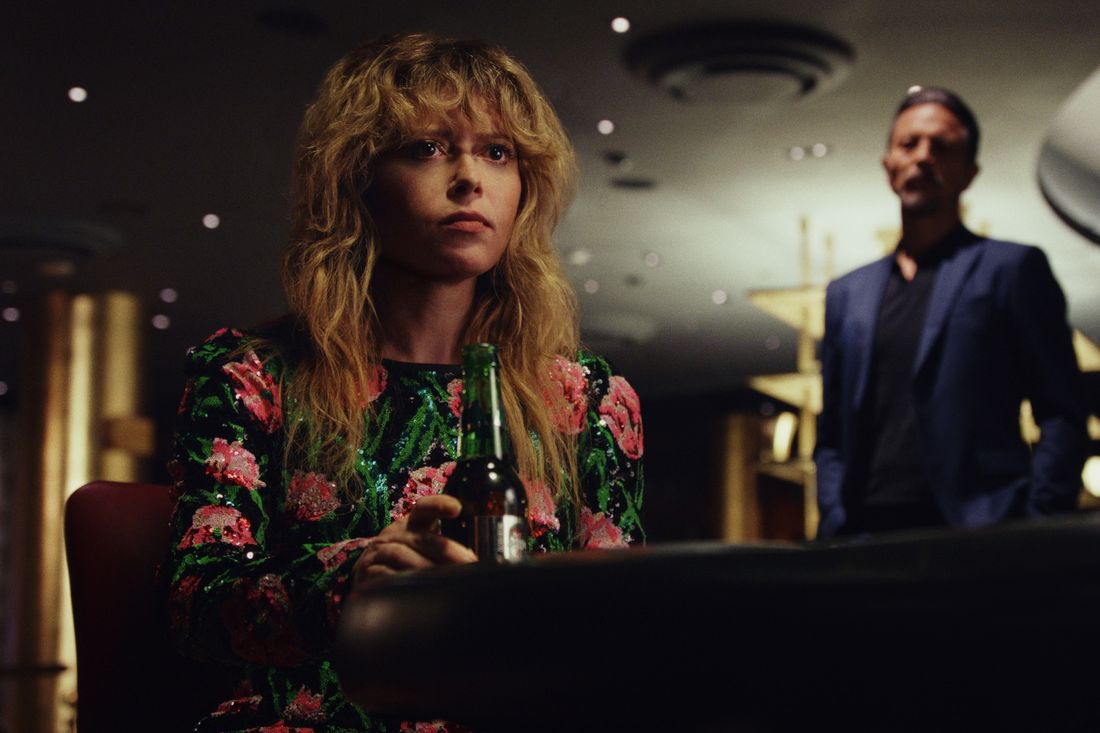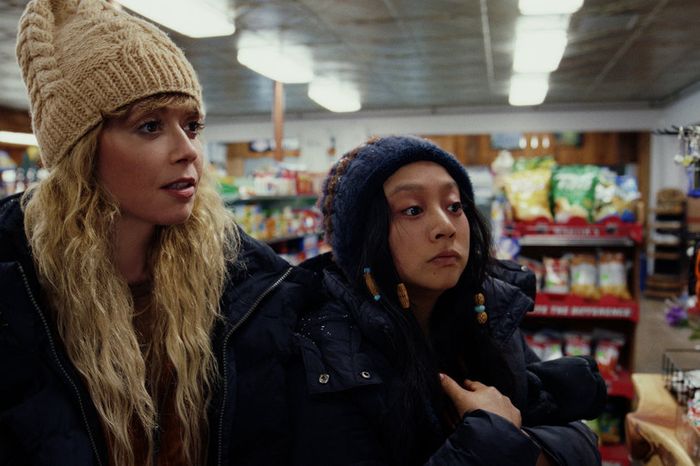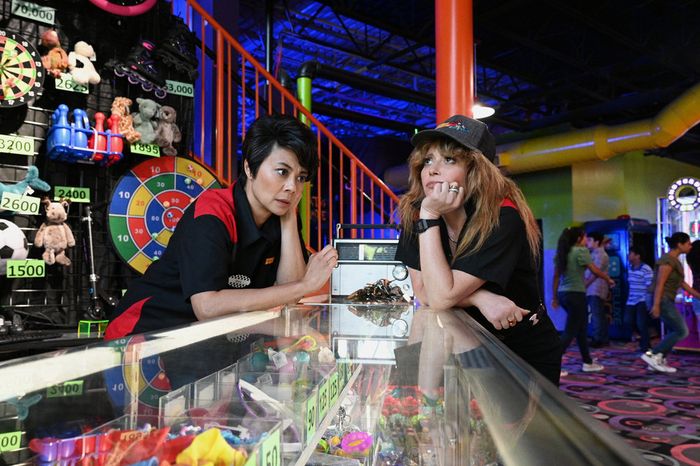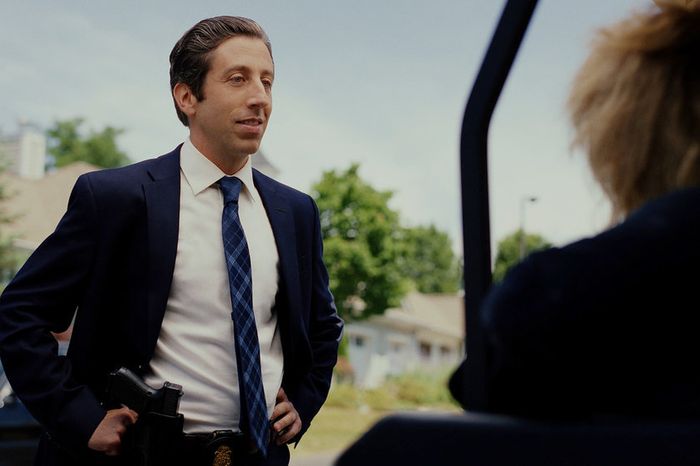
Poker Face has been a surprising treat in the world of streaming TV this winter. The Peacock episodic mystery, created by Rian Johnson and led by Natasha Lyonne, updates some of the most successful formats in TV history, used in shows that have proven durable and popular over decades of programming: Columbo, which Johnson has described as the main touch point for Poker Face’s storytelling model, and going back further to series such as Perry Mason and The Detectives through shows like Bones or Burn Notice (which characters in Poker Face watch regularly) and continuing to the procedural series of network TV today.
It is, however, an unusual type of show for streaming, where most TV series emphasize serialized plotting and slow-burn character development. Johnson knew it was an odd sell for most streaming platforms, but his pitch, he says, was never just that it was a new Columbo or that it would capitalize on the healthy audience of streaming-TV viewers who use those platforms to watch network procedurals. It was that Poker Face would be a TV show first and foremost, an arms-wide embrace of episodic storytelling and its many benefits and opportunities.
In a spoiler-filled conversation looking back on the now-complete first season, Johnson digs into exactly what that means and how he approached the process of developing Lyonne’s Charlie Cale with the hope that she might prove just as durable as someone like Columbo or Jessica Fletcher.
Poker Face spends most of its season working in the Columbo mode you’ve been so careful to establish, but these last two episodes are clearly a shift — less Columbo, more network TV during sweeps week.
I love the sweeps-week reference. Yes, absolutely. Who’s going to die on this week’s Poker Face?
On the one hand, it was against what I had been adamantly pitching from the start, which was resisting the lure of serialized storytelling. On the other hand, though, not really. This goes back to the stuff I grew up watching as a kid. Even on Quantum Leap, they’d tease that he’s going to figure it out and get back home or do the episode with his wife. Those were always feints toward serialized storytelling, and in that way, we liked the notion of ending the season with something like that.
I don’t think I could have ended the season without giving it some big season ending. It felt really good to do something that broke the mold and felt like a cap in a satisfying way, which means calling back to the beginning.
Had you considered trying to hold off the Benjamin Bratt resolution for longer? It’s not hard to imagine stretching that premise for at least another season.
I felt like we could’ve, and the nice thing about it was that it was not like, Okay, people are getting sick of this, we’ve gotta wrap it up. At this point in the season, if you’re not onboard for that element’s place in the series, you’re probably not onboard for the series. And that’s what felt exciting about coming back to him and making him so central to the finale. We’d lulled the viewer into the sense that he would just be an ongoing character who pops up now and then.
The first expectation I had when we talked about him coming back for the finale was that there’d be a crime and he and Charlie would be forced to work together, so the idea of immediately short-circuiting that was really appealing to me. But yes, I felt like we could’ve easily kept him going in that mode. Which is why it felt exciting to snap it.
The penultimate episode is also about playing with audience expectations — I was so surprised that Charlie was the one who’d been hurt! I was so sure it was Morty, and it does give you that sudden uncertainty about whether this is actually a different kind of show than you thought it was.
Totally. Lilla and Nora Zuckerman, our showrunners, pitched that twist. I’d wanted to do a more scary episode, and I grew up in Colorado and had been wanting to do something in the Rockies. Lilla came in and pitched this whole thing, and I was like, Oh my God, that’s very exciting.
It lets us break the expectation without completely breaking the structure of the episode — which the finale does, too. We still do a version of the crime, the flashback. We shuffle it a little bit, but it still gives you the structure. And that was important to me, too, that we don’t entirely break form with the last two. Even the finale, which breaks form the most, still gives you the crime, the flashback, the aha solve-it structure. It was important to me that we didn’t just do a sudden drama episode of TV, that we are still our show even when we’re shaking it up.
Even when you’re doing sweeps week.
Yeah, exactly. “A very special episode.” My only regret is that we didn’t do a “To be continued …” I was always so excited watching TV when that came up! Next season.
There are all of these different ways of shifting the detective figure — amateur or professional, with or against law enforcement. What does Charlie’s amateur status give her?
That fundamental decision to make her say in the pilot, “I’m not a cop,” was both a massive challenge for every episode in the writers’ room and also presented us a great opportunity to have this other layer to every episode. On a fundamental storytelling level, it means she needs skin in the game. She needs a reason to be invested in some element of the crime, where she has this Galahad-like thing in her brain where she can’t see someone she likes get screwed. That means that, every single episode, we had to figure out a different way for Charlie to have some genuine reason why she gives a shit and cares enough to put herself in genuine danger. It ended up being one of the great strengths of the character — it’s not her job. In fact, she’d be much better served by getting in her Barracuda and getting out of town every time. But she’s like De Niro at the end of Heat. She just can’t leave it alone.
I won’t lie, though. It was a very big challenge in the writers’ room: How can we do a different version of that every week that feels genuine and you actually buy?
The penultimate episode is a great example of that because Charlie is stuck with someone she doesn’t actually like.
She’s trapped in it! But even though she and Morty are not exactly best friends, there’s still something when she hears the guys talking so cavalierly about bumping off Morty; you can see that thing still get triggered in her. But it’s much more of a survival episode, and we had the luxury of doing that because of the essential twist that she was going to be the one in peril.
And sometimes it’s a racist dog that you get stuck with.
I had this notion of a dog getting us into it, that the crime is incidental but the dog gets killed. And then, when we flashback, the dog is in the car with Charlie. But I kept hitting this issue that it was too mean. I remember being in the shower and thinking, But what if the dog’s an asshole?, and getting so excited! I was like Ray Liotta in Goodfellas when he hears about the heist. Just, Yeah!
The fundamentally humane and compassionate aspect of Charlie is interesting in part because when we find her at the beginning of the show, it almost seems like she’s somehow been plunked down into the desert fully formed.
I wrote my first movie right out of college and basically spent my 20s miserable in L.A. trying to get it made and failing and working a series of day jobs. During that period, that decade of thinking that I might not get to do what I wanted to do in life, I got to a place where every job I was in, I had to make a shift in my brain. I had to do what Charlie does in the pilot and say, I’m doing just fine. I’m working with good people; I can be creative in this job. Out of survival, so I didn’t become a miserable person. You see Charlie on the floor in the casino, she gets to interact with people and she likes the people she works with. She’s got a good setup. Something made sense about someone who is genuinely open and interested in humanity: They will be happy wherever they land and will take wherever they land and be able to make a rich, satisfying world out of that. Even if it’s in Laughlin, Nevada.
That comes back to the challenge of a new setting for every episode and Charlie’s need to have a connection to it. You could imagine that being easier if it was her town and she felt like she needed to protect it.
It also helps, though, in a mechanical writing way. If she was a cynic, it would be very difficult. The fact that she likes humanity and wants to help people means she can be starting conversations, she can be digging into these worlds. Combined with Natasha’s natural briny acidity making a very appealing, watchable character, it lets us have her engage. You buy that she’s made friends with whatever people are around, and she assumes the best of everybody. When you see that she’s buddies with the woman who runs the go-kart place, you’re like, Oh, yeah, of course she is.
Poker Face depicts all of its murderers as clearly bad people, which makes sense given the overall worldview of the show. But it’s also a show where the victims are always portrayed as inherently good — which is not always the case in this genre.
Definitely not in Columbo, no — that’s true.
I was curious about that choice. Is it because Charlie needs to feel that they were wronged so she can avenge them?
For the structural writing part of my brain, it all goes back to the fact that she’s not a cop and the fact that I want an ending to be truly satisfying. That doesn’t just mean solving the crime. That means feeling some element of justice, that we’re happy we saw that justice happen. You get that if the detective is a cop and he’s happy he found the guy in the end. But with Charlie, what we’re betting on is that you buy her emotional involvement in the crime getting solved. You have to feel angry with the idea that someone has gotten away with this crime. It’s not just what she’s been assigned that week and the satisfaction of seeing her accomplish it.
It makes a lot of sense in terms of the character, but it’s all toward the goal of creating an ending that the audience will feel satisfied by. And by the way, when I was first telling my producer I wanted to do this, the genre I pitched him was not “mystery.” I pitched him “TV.” I said I wanted to do a great TV show!
But inherent in TV-episode structure is that if it’s too satisfying, if it’s done too well, then it’s done. That need for the satisfaction to be chewy and fulfilling but to also create enough hunger for an audience to want to come back next week — it’s one of my very favorite things about the form, the satisfying ending that still has a hook for next week.
The hook! It gets you back!
It’s trickier in this genre!
In a way, it almost felt like an experiment, making this season and putting it out there. The reality is that I gave very little thought to the notion of making people want to tune in next week. To me, the aim was to make every episode as fulfilling as possible, and then the “I want to tune in next week” is because you want that again. But at the same time, God bless Peacock for betting on this because it’s exactly the opposite of how TV operates these days.
Certainly streaming TV, yeah.
Or prestige TV or whatever you want to call it. I felt like I was speaking another language when I was pitching it. It was shocking to me how big a disconnect it was given that I feel like that’s the mode of a lot of stuff I grew up watching.
Although now I’m casting my mind back to shows like The Incredible Hulk or Quantum Leap and the degree to which each episode does end in a satisfying way. But I don’t know! The feint of “Will Sam ever get home?” — it’s not ever like you actually wonder if he’s going to get home. You’re really coming back to see where he’s going next week, what body he’s going to jump into. What do you think?
I completely agree, but I also wonder whether there’s now such an assumption that streaming seasons will have very serialized plots that it’s become harder to predict what audiences will and will not accept.
One thing I would bring up in pitches — a thing I kept in the back of my head in a panicky, “Will people keep watching a show like this?” way that gave me hope — is the resurgence in popularity of old sitcoms on streaming platforms. In reality, that’s what we’re describing. A familiar format, a familiar structure, a central character you want to come back and hang out with every week. Sometimes you’ll have the wedding episode or whatever it is, but for the majority of it you’re coming back to a version of the same thing every week.
Yes, but the way you’ve built the end of the season reminds me more of the structure of something like Bones with that big closed arc of the season alongside self-contained episode stories.
Sure, and that’s something that Columbo or Magnum P.I. would never have done, where there is no concept of a finale; it just keeps going. But I love endings too much to have ever done that.
Why do you love endings so much?
It’s the thing I love about stories, the feeling that a good ending gives you. I remember so vividly the feeling of seeing the ending of E.T. in the theater — that simultaneous emotional catharsis, elation, and thrill of a perfect ending where all of the elements from the beginning came together at the end. Or The Sting. So many of my great memories of what I loved are feelings of endings.
I write very structurally. Even when what I’m going for is an emotional reaction from the audience, my brain approaches it in a structural way. The notion of building something where the thing works as a machine, as a whole, as one beautiful object you can hold in your hands and step back from, has a lot of appeal to me.
In this respect, one element of Poker Face that’s interesting is that sometimes episodes end without playing out the full beat of a resolution. Sometimes we get a gesture toward what the future will be for the guest characters, and then Charlie runs.
I hope there’s always some element of justice served. The one where the least happens is probably the racing episode, but it’s a tricky thing because, at the end of the day, no one actually dies in that episode. It’s an attempted murder, but no one actually dies, and it did become a question of “Okay, what is the justice that we can leave with?” What we came up with was the notion that he’s got everything he wants, but she’s incepted this thing into his brain and he’s totally fucked.
We did have it up as an idea that we’d do an episode where, whether because she likes the person or whatever, she lets them off the hook.
I was waiting for one!
Eventually, we’ll probably do one. But for whatever reason it always felt unsatisfying to me. So even when you don’t get a scene where the cops pull up at the end, to me, I was always trying to get the episodes to end in a way where we feel justice has been served.
Simon Helberg’s FBI character, Luca, seems relevant here. He lets Charlie insist she’s not a cop, but his presence in the show — and especially in the finale — does create the sense that, at least from a distance, law enforcement tacitly approves of Charlie’s vigilante justice.
We gotta break that in season two. That gives me the creeps!
We use him very sparingly, but I would never want Charlie to be in a situation where she’s working hand in glove with the authorities. It doesn’t feel like her and it doesn’t feel like the show. But especially in that final episode, it was very useful to have a confederate she could get in touch with and who could help explain the stakes for the audience. And in terms of the end paying off the beginning, that would only be satisfied by Benjamin Bratt getting busted by some kind of law enforcement, and local police wouldn’t have done it. It had to be someone with an overarching jurisdiction. But now that makes me want to have a bad-FBI episode in season two!
The cop part of him aside, what I did like about Luca’s occasional presence in her life is that Charlie is everyone’s friend, but because of the formula of the series, we all know she’s never going to actually keep any of these friendships for more than a single episode. It was really nice for Charlie to have at least one longer-term connection to someone. Sherlock Holmes doesn’t work without Watson! And I know the finale does create some ties to Charlie’s family, but —
But we also push it away, yeah.
It also takes the edge off a little bit in the finale — Luca gets on his private burner phone to talk to her because the reality is that, if she’s brought in by authorities, she’ll probably die in prison.
He also feels like a pressure-release valve. It’s nice to have someone who recognizes that she keeps stumbling into all these crimes.
That too is so tricky, and I think it does help to have a little bit of a poker face with the audience. We say, We all know what the deal is here, and we all know what we’re buying into. You can very much outstay your welcome by being too cheeky about that element of it. But it does feel good to have Charlie say, “I have been kind of a death magnet.”
The other thing I’ve been wondering about is some kind of Watson, some kind of partner on the road. The reason I push back on that at least for season one is because, in every episode, the notion is that the guest stars are the emotional content. I am always thinking about real estate in terms of minutes on the screen or pages in the script. If your object is for Charlie to have formed relationships with the people in the story that are going to pay off at the end, the idea of spending any of that time or energy on somebody who is doing the same thing as Charlie like wasted calories to me. Even though it’s appealing!
The format of the show is built to run forever. Is that the goal?
Our hope is that she’s Angela Lansbury and 12 seasons down the line we’re cutting a big cake with “Happy 1,000th Episode” on it. I guess it’s streaming, so maybe 100th episode.
It’s a fun challenge, thinking about the bigger picture of next season, ways to keep doing the show that feel like the show but are new. It works two different muscles at once. It’s both coming up with ten new variants of this same format that are going to be thrilling and fun, but it’s also thinking, What’s a bigger framing device that doesn’t feel like repeating the first season? That can be satisfying and have that season-finale sweeps-week element of it all, too.
I’m curious about motives. Most of the crimes on Poker Face are committed for some version of money or power — it’s not really the kind of show where Charlie meets sociopaths or hunts down a serial killer who’s killing for fun. Or is it?
Well, we haven’t yet! We had that on the board, though, and we wouldn’t necessarily not do something like that. The other thing that was on the board was the notion that she might encounter someone who was her kryptonite, who she can’t get a read on.
How do you think about balancing Charlie’s bullshit meter? It’s key to the premise, so it has to show up regularly. But it’s also something you have to use judiciously.
We talked about this a lot in the room, that we have to figure out side doors into using the gift. There’s the moment in the barbecue episode where she catches Danielle’s character in the lie about the paprika. That, for us, was an early thing we struck on, and our shorthand in the room became “looking for the paprika moment,” things that were completely tangential and not the linchpin of the crime itself but were the little thread on the edge of the sweater you just start pulling — until “The Orpheus Syndrome,” when it was very fun to subvert that. But for the most part it was about trying to find the least obvious to use it. That would really give her the sense that something’s fishy, and then she starts digging into investigating.
The gift is much more satisfying when it’s put into use as a game of chess between her and the killer. Whether that means the killer knows the gift is there and is talking around it, or it’s because we know so we can follow the thread of it. That’s how we tried to approach it: It has to be either dramatically fun, or a glancing side thing that starts things rolling.
Do you have a dream list of guest stars for next season?
Oh my God, so many. So many! But also it’s tough — casting is really, really hard. When I was pitching this, I kept saying, “Why aren’t people making shows like this anymore?” And then halfway through making this season, I was like, Oh! This is why!
Really? I thought maybe it might be easier to offer people roles they can do for a few weeks rather than having to secure them for months or years of a TV series.
Everybody’s so busy, and it’s asking people to come for just a few weeks to upstate New York. It’s harder than you think. I can’t believe the lineup we got for this season, and our casting directors did the Lord’s work. But it was not easy.
More From This Series
- Poker Face Season Two? We Wouldn’t Lie About It
- The Recipe Works
- The 10 Best TV Needle Drops of 2023





